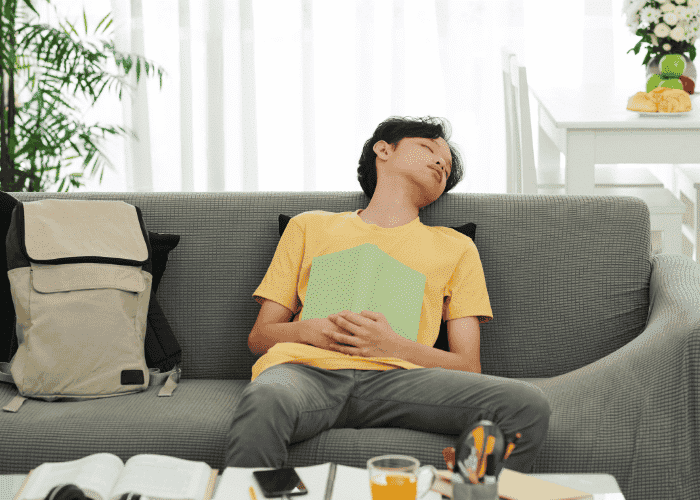Daytime Sleepiness in Teens: Causes & Treatment Options for Fatigue & Low Motivation

Sleep. How important is it really? A good night’s sleep can make you feel like a whole new person, but when sleep continues to be disrupted or inconsistent, it can completely unbalance your life. Sleep is one of the most essential aspects of being healthy and happy, yet it’s common culture to treat it as an afterthought.
Sleep should be one of the things we put on top of the self-care list. Before work, errands, driving, or any other important activity. It’s also of particular importance during adolescence.
Since teenagers are still developing physically, mentally, and overall, their sleep is essential in setting the stage for a healthy, growing body and mind.
Sleep helps us recover from the previous day, and it allows our bodies the time they need to restore. We’re like our beloved tablets and phones in that our bed is our recharging station where we can reboot, restore, and download the previous day into memory.
If sleep continues to be disrupted, it can be damaging to both emotional and physical well-being. It can also signal underlying mental health conditions that may require professional support.
This page can help you better understand the daytime sleepiness teens can experience, as it explores:
- What daytime sleepiness is
- The symptoms of daytime sleepiness in teens
- Causes of fatigue and low motivation in teens
- The impact of teen fatigue
- Teen sleep disorder help
- Where to find professional support for issues like teen fatigue and depression

What Is Daytime Sleepiness?
Daytime sleepiness, fatigue, and low motivation are not uncommon complaints from teens, so how can we tell when it’s a problem that requires intervention? When a teenager’s fatigue or low motivation is negatively affecting their school work, relationships, or extracurriculars, or if they are having health issues, it may be time to take notice.
Adolescents are in a special time in their lives where they are experiencing several physiological changes that can affect their sleep. So it’s important to get all the facts before requesting a prescription or even taking an over-the-counter medication.
If you’re concerned about your child’s sleepiness, talk with a doctor about the teen’s routine and discuss potential treatments to get them back on track.1
How Much Sleep Is Too Much (or Too Little)?
Unhealthy levels of sleep are common among, well, everyone. We begin to learn habits from the adults in our lives as children and start to implement these as we become more independent in our teen years. However, for optimal health, teens should be getting between eight to ten hours of sleep per night.
During the teenage years, teens are often balancing friends, extracurriculars, jobs, and school, which can easily alter sleep patterns. However, a problem can develop if disordered sleep becomes the new normal and continues into adulthood.2
To help you better understand whether disordered sleep is becoming a problem, the signs of daytime sleepiness may give some insight.
Symptoms of Daytime Sleepiness in Teens
Aside from sleeping the day away, there are several other indicators that an adolescent may be suffering from daytime sleepiness. Although most teens find sleep a challenge from time to time, if a teen experiences some of the following, it may be time to consult with a physician:
- Anxiety
- Irritability
- Hallucinations
- Dizziness
- Disordered eating
- Drastic weight changes
- Concentration issues
- Memory problems
- Physical problems
- Headaches
- Brain fog
Any or multiple of these symptoms should prompt the parent of a teenager to get them checked out by a physician. Teenagers are at a delicate age, and the sooner you can get these issues resolved and help the teen develop better sleep habits, the better.3-5
Causes of Fatigue & Low Motivation in Teens
When it comes to sleep, there are multiple reasons why it can become out of sorts. Lifestyle, sleep hygiene, and emotional, mental, and physical health can have a profound effect on how your body recovers and remembers the experiences of each day.
We explore each of these factors below.
- Medical and biological factors
- Aside from things we can control, there are potential medical and biological reasons why your teen might not be getting the sleep they need, such as immune system, hormone, or nervous system problems. If you suspect they are experiencing problems sleeping because of a medical issue, talk to their pediatrician right away.6
- Emotional & mental health factors
- Is your teenager struggling with friends, family, emotions, or mental health? If so, sleep might feel impossible to them. Talk with them about what is going on in their lives and how they are dealing with it emotionally.
- Lifestyle factors
- Consider whether your teenager’s current lifestyle allows for enough healthy sleep. Are they getting enough time in bed to sleep the appropriate hours? Are they consuming caffeine, medicines, or other substances that could affect the sleep cycle? These are some of the lifestyle factors to think about when an adolescent is not getting enough sleep.
Sleep Disorders Leading to Daytime Sleepiness
Over time, when we don’t get enough sleep, it can develop into a disorder. This is when the pattern sets in and becomes a new kind of normal. It’s important to talk with a physician or mental health professional if you are concerned that a sleep-deprived teen has a disorder.
Here are some examples of commonly diagnosed disorders in teenagers:
- Hypersomnia
- Common symptoms include: Anxiety, irritability, decreased energy, extreme daytime sleepiness, hallucinations, headaches, loss of appetite, memory problems, and trouble focusing.3
- Teenage Fatigue Syndrome (Chronic Fatigue)
- Symptoms include: Tiredness, forgetfulness, concentration problems, dizziness, confusion, joint pain, headaches, irritability, muscle aches and weakness, sore throat, and sore or swollen lymph nodes in the neck or under the arms.4
- Narcolepsy
- Although rare, teenagers can be diagnosed with uncontrollable bouts of falling asleep. Narcolepsy has two forms:
- Type 1: Hallucinations, daytime sleepiness, sleep paralysis, cataplexy (muscle weakness triggered by strong emotions), waking up often at night, falling asleep during tasks, sudden weight gain.
- Type 2: Includes all of the components of type one, but without cataplexy. 5
- Although rare, teenagers can be diagnosed with uncontrollable bouts of falling asleep. Narcolepsy has two forms:
- Other sleep disorders
- Any number of other issues can affect your teenager’s sleep, including insomnia, circadian rhythm disorder, and sleep apnea.
How Teen Fatigue Affects School & Mental Health
Sleep deprivation can wear down the mind and make even easy tasks feel much more difficult. A lack of sleep can have negative effects on anyone, but for teens, their brains and bodies are still developing. In fact, the better an adolescent’s sleep and nutrition are as they grow can even determine their overall health as adults.
When an adolescent isn’t sleeping well, they may feel incapable of focusing on important things like school and home life, which can negatively impact their lives and cause additional distress. Furthermore, if students are missing school, sleeping in class, or are otherwise “absent” from their peers, this can create a sense of distance and affect their mental health.
When to Consult a Doctor
If your teen is experiencing problems in school, work, or with family or friends due to lack of sleep, you should consult a doctor. Help for drained teens is available to you. It is always better to have professional guidance when going through a time of imbalance, particularly when it comes to sleep.
Mental health conditions like depression are common among sleep-deprived teens, especially if they are predisposed to mood disorders. Furthermore, lack of sleep can cause an increased risk of injuries, difficulty regulating emotions, and risky behavior. A doctor can help you to decide the level of care that you need and assist you with navigating the mental health system.7
Teen Treatment Programs & Other Support Options
Daytime sleepiness in teens can be a difficult thing to manage as a parent. Fortunately, there are several levels of care available, so you and your teenager can choose the right one for your situation. If this is your first time interacting with mental health care staff, know that they are there to help you find the right type of help for tired teens.
We discuss some of the available options below.
Therapy and Teen Treatment Programs
A commonly utilized therapy is cognitive behavioral therapy (CBT), which can take place in outpatient sessions or at a residential facility. Other kinds of talk therapy can also be used to help your teen find the habits or behaviors that are influencing sleep, such as psychodynamic therapy. The therapists and physicians in mental health treatment programs are devoted to helping your teen find the best method for coping with exhaustion and other issues associated with a lack of sleep.
Medical Interventions
In some cases, your teen may need medications to help regulate their sleep. Your healthcare provider can help you determine the best option for their needs. Medicine combined with lifestyle changes, improved sleep hygiene, therapy, and treatments for other underlying causes can assist in getting a teen the night’s sleep an adolescent body deserves.3
Natural & Lifestyle Methods
The following lifestyle factors aren’t a replacement for professional treatment, but they can complement it excellently.
- Sleep hygiene
- One of the easiest ways to get sleep back on track is to commit to a bedtime and wake-up time every day. This, in combination with getting sunlight first thing in the morning and evening light during sunset, can help to naturally reset circadian rhythms.
- Nutrition and eating schedule
- What you put into your body can affect your sleep. Feed it healthy greens, protein, and whole foods throughout the day to keep a moving gut. Also, try not to eat less than 2 hours before bedtime to prevent the body from doing heavy digestive lifting while it’s trying to rest.
- Movement
- In order to sleep well, humans have to get enough exercise for the body and mind to become tired. Your teen should be getting in movement and exercise each day, whether that be walking, running, yoga, climbing, weight training, or any other form of activity they enjoy.
- Stress Management
- As many of us know, when our thoughts won’t quieten, sleep can be nearly impossible. Stress management can be key to breaking the barrier to a good night’s rest. Journal your worries before bed to get them out of your head, practice a meditation, read, or do any or all of the above to relax you into a bedtime routine.

AMFM: Support & Coping Strategies for Teens
Everyone struggles to balance all of life’s changes from time to time, and teens often experience these challenges alongside major hormonal changes. At Mission Prep, we offer the most up-to-date evidence-based therapy for sleep issues that teens face today, from sleep disorders to teen fatigue and depression.
Our trained team of professionals can ensure treatment is tailored to your teen’s specific needs. So if daytime sleepiness is affecting your teen’s ability to function, we can help. Reach out to us today to learn more about our treatment options and how we can restore rest to your teen’s life.
References
- Hein, M., Mungo, A., Hubain, P., & Loas, G. (2020). Excessive daytime sleepiness in adolescents: Current treatment strategies. Sleep Science, 13(1), 43–52. https://doi.org/10.5935/1984-0063.20190143
- Noble, D. (2024, November 22). How much sleep do you need? Expert recommendations for every age. Mayo Clinic Press. https://mcpress.mayoclinic.org/living-well/how-much-sleep-do-you-need-expert-recommendations-for-every-age/
- Cleveland Clinic. (2025, June 2). Hypersomnia. https://my.clevelandclinic.org/health/diseases/21591-hypersomnia
- Texas Children’s Hospital. (2015, May 12). Chronic fatigue in teenagers. https://www.texaschildrens.org/content/wellness/chronic-fatigue-teenagers
- Cleveland Clinic. (2025, October 1). Narcolepsy in children. https://my.clevelandclinic.org/health/diseases/14307-narcolepsy-in-children
- Nemours KidsHealth. (n.d.). Chronic fatigue syndrome (for teens). https://kidshealth.org/en/teens/cfs.html
- Garey, J. (2024, March 8). Teens and sleep: The cost of sleep deprivation. Child Mind Institute. https://childmind.org/article/happens-teenagers-dont-get-enough-sleep/













